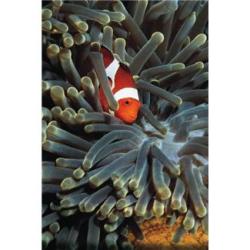Source Institutions
Source Institutions
Add to list Go to activity
Activity link broken? See if it's at the internet archive

In this activity, learners experience firsthand how marine animals' adaptive coloration camouflages them from prey. Learners design fish out of red paper and then attempt to locate their fish on the wall in a darkened room, while looking through blue cellophane. In doing so, learners will explore concepts related to fish anatomy, adaptive and disruptive coloration, ecological principles, and the physics of light (as it passes through water). This activity is successful because these concepts can be more clearly understood if the learner has been exposed firsthand to some of the dilemmas facing these organisms in their natural environment.
- 10 to 30 minutes
- 45 to 60 minutes
- $1 - $5 per group of students
- Ages 14 - 18
- Activity, Lesson/Lesson Plan, Simulation
- English
Quick Guide
Materials List (per group of students)
- pencils
- pieces of red construction paper (8 X 11")
- scissors
- pieces of blue cellophane (from art supply store) double thickness 4 x 11"
- tape
Subjects
-
Earth and Space Science
-
Earth Structure
- Oceans and Water
-
Earth Structure
-
Life Sciences
-
Diversity of Life
- Animals
-
Ecology
- Ecosystems
-
Evolution
- Mechanisms of Evolution
-
Human Senses and Perception
- Vision
-
Diversity of Life
-
Physical Sciences
- Vibration and Waves
-
Light and Optics
- Electromagnetic Spectrum
-
The Nature of Science
-
The Scientific Process
- Conducting Investigations
-
The Scientific Process
Informal Categories
- Animals
- Arts and Crafts
- Nature and Environment
Audience
To use this activity, learners need to:
- see
- see color
- read
- be mobile
- touch
Learning styles supported:
- Involves hands-on or lab activities
Other
This resource is part of:
Access Rights:
- Free access
By:
- Berg, Betsy
Rights:
- All rights reserved, Access Excellence @ the National Health Museum, 2009
